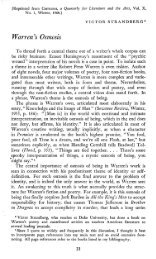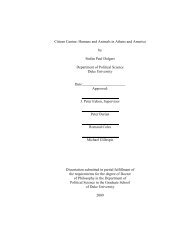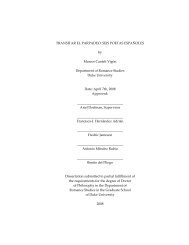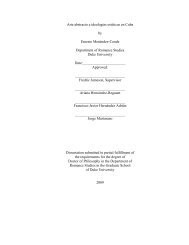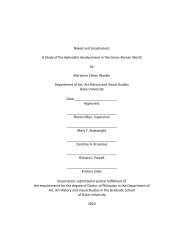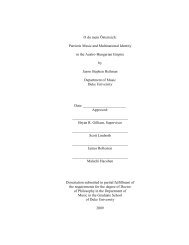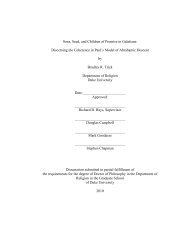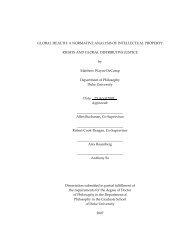View/Open - DukeSpace - Duke University
View/Open - DukeSpace - Duke University
View/Open - DukeSpace - Duke University
Create successful ePaper yourself
Turn your PDF publications into a flip-book with our unique Google optimized e-Paper software.
political discourse strengthened when Sun Yat-Sen, leader of the 1911 Chinese Democratic<br />
Revolution to overthrow the Qing Dynasty monarchy, deployed the phrase in his works (Chou<br />
2000). In a famous quote from his will, Sun used “tongzhi” to urge his followers to continue the<br />
revolution: “The revolution hasn't succeeded yet. Tongzhi, keep up the good work! [ 革 命 尚 未 成<br />
功 , 同 志 仍 须 努 力 。Geming shangwei chenggong, tongzhi rengxu nuli]” (1925, qtd. in Wong<br />
and Zhang 2000, 262). To date, Sun is respected by Chinese of different political convictions<br />
across Taiwan, Hong Kong, and the Mainland as the founder of modern China.<br />
During the Communist Revolution (1920s – 1949), “tongzhi” acquired enhanced political<br />
and revolutionist connotations when the term signaled equality, respect, solidarity, and<br />
camaraderie amongst all revolutionaries (Wong 2005). The PRC’s founding in 1949 also<br />
witnessed the Communist Party’s default use of “tongzhi” to address everyone regardless of age,<br />
gender, class, or occupation (Tsai 1988). The expression emphasized equality for all Chinese and<br />
a shared goal in building a socialist China (Wong and Zhang 2001). In 1989, however, “tongzhi”<br />
was first used in the Chinese title of the inaugural Hong Kong Gay and Lesbian Film Festival ( 香<br />
港 第 一 界 同 志 电 影 节 xianggang diyi jie tongzhi dianying jie) as a term for same-sex desire.<br />
After the festival, tongzhi was widely adopted by gay and lesbian organizations in Hong Kong<br />
and was then exported to Taiwan, mainland China, and diasporic Chinese communities (Zhou<br />
1997). Hence, although “tongzhi” still resonates with the socialist ideal for an equal society, the<br />
term has been transformed into the most popular word referring to Chinese homosexuals,<br />
especially male homosexuals (Wong 2008). 5 In contrast, the medical term “homosexual” ( 同 性<br />
5 It is also important to note that, unlike “homosexual” or “heterosexual,” tongzhi counteracts the negative stigma of<br />
homosexuality in mainstream Chinese society and pluralizes sexuality. The word itself is not restricted in definition<br />
by the gender of one’s erotic subject (tongzhi can denote either male or female) and describes a range of nonheteronormative<br />
sexual practices (including transgender and bisexual behaviors). In this way, tongzhi does not<br />
privilege the self or the individual, both in reference to gender and sexuality and a broader social context (Bao 2011).<br />
Introduction | 6



